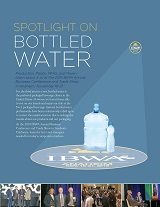At Bottled Water Matters, we respect everyone’s opinion on bottled water. But we prefer the opinion be made out of having the right information. Sustainablog.org doesn’t do so this week.
Jeff McIntire-Strasburg, writing for the Earth blog, makes several incorrect claims:
As you probably know, [the convenience of bottled water] comes at an environmental and social price: documentaries such asFLOW and Thirst, organizations such as the Sierra Club and Environmental Defense Fund, and even a few of us lowly bloggers, have reported on the costs created by water’s transformation from a freely-available resource to a multi-billion dollar commodity. That bottle of water you buy now contributes to the world’s third-largest industry.
Just as in any industry, there are costs involved in creating bottled water, both financially and in terms of natural resources. But consider how much so, in the grand scheme of things. Plastic bottles – which have an array of uses, not just in bottled water – make up one-third of 1 percent of the municipal waste stream in the U.S. That is, pardon the pun, a drop in the bucket when you look at the big picture. In other words, getting rid of bottled water or banning it will do next-to-nothing to save the environment.
Water is also not freely available. You pay for tap just as you pay for bottled water. Bottled water costs a bit more because of the packaging and the processes that go into filtering and purifying the water, not to mention the payroll costs of the many small businesses that create these products.
And bottled water is the world’s third-largest industry, the post claims? That would be news to us. Bottled water is nowhere near the top of the world’s largest industries. Wholesale dollar sales for bottled water exceeded $11.7 billion in 2007. An “industry” is generally counted in the trillions of dollars.
For matters of comparison:
- Fortune recently ranked “beverages” as the 12th largest industry in the world. Which makes sense, because hydration and drinks are essential to sustain human life.
- Walmart, the largest company in the world, had sales of $378 billion in 2007.
- In that same year, no Fortune 500 company had sales less than $16 billion.
Opinions are fine, and we respect Mr. McIntire-Strasburg’s. We just wish he’d dug a bit deeper.



























